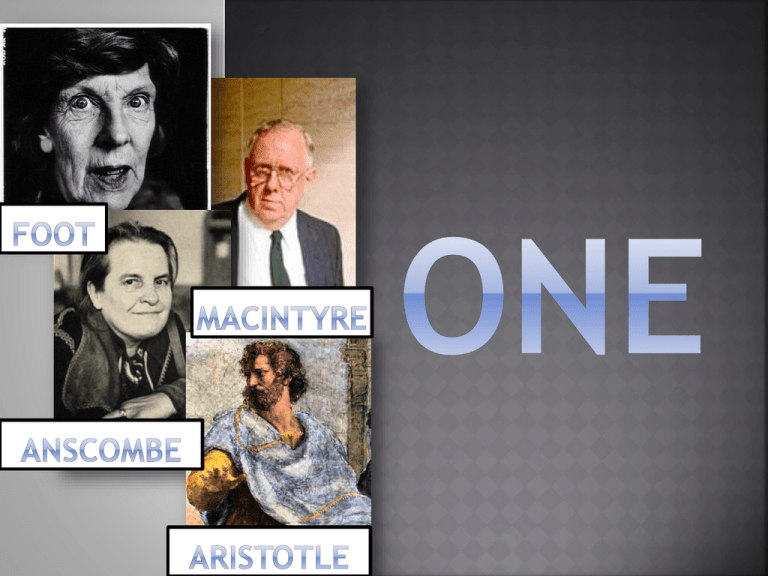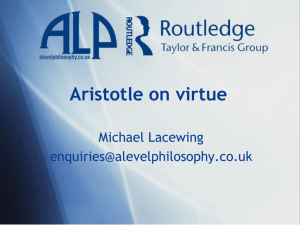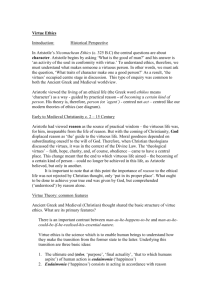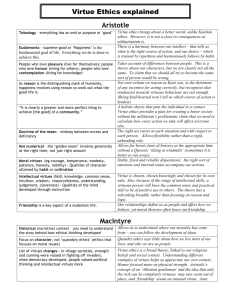lesson 5 virtue ethics
advertisement

1. Make a list of people who you consider to be ‘good people’ in some sense and then try to identify what characteristics or virtues they exhibit which make them good. To understand what virtue ethics is, Key question What is a virtue? “what would the hero do in this situation?” Or, if contemplating an action “would the hero do this or avoid it? “Excellence is an art won by training and habituation. We do not act rightly because we have virtue or excellence, but we rather have those because we have acted rightly. We are what we repeatedly do. Excellence, then, is not an act but a habit.” Aristotle It concentrates on the idea of the human character and asks how you can be a better person. Ethikos – concerned with the ethical character of an individual rather than the individual actions. It is concerned with the personality of the person. Their moral character. According to this view Jesus is the ideal and followers ought to be more Jesus-like. Virtue Ethics is very often used in professional ethics : (How would an ideal doctor/lawyer behave?) We should be less concerned with action and consequences and much more concerned with the character of the moral agent. The question “what is it right or obligatory to do?” is not the only question. “How should we be?” Matters too because it is only by becoming better people that we will do the right thing. While other ethical theories concentrate simply on the process of moral decision making, virtue theory is concerned about the process of how to become a moral person. Once you have become a moral person – you will do the right thing. The roots of virtue theory are in Greek philosophy, especially Aristotle modern important contributors to virtue theory are: Elizabeth Anscombe Alasdair Macintyre Phillipa foot We will discuss each in turn focusing specifically on Aristotle and MacIntyre's adjustments. “to understand a theory you need to know its context.” Alisdair Macintyre Ancient Greek philosophy is dominated by two philosophers. These men are called the fathers of philosophy. Both were crucial in the development of western and middle eastern thought for the last two thousand years. Their reach includes, mathematics, philosophy, ethics, politics, aesthics and many more. Plato points to the sky – highlighting his concern with the metaphysical realm that can only be discovered through philosophical investigation. Metaphysical – the realm beyond the physical. The TRUE reality. Aristotle points to the ground – highlighting his concern with the physical realm that can be discovered through science. Aristotle’s science shaped his ethics. “Good” he said can also be defined in terms of either; outcome or motive where the reasons for the action define its being good or otherwise) Outcome Motive Right action/ person For Aristotle something is “Good” if it fulfils its purpose. A good knife is one which is sharp and which cuts well. Achieving the final purpose for a thing is ‘GOOD’ for that thing. Achieving the final purpose for a human is good for that human. A human life that is geared towards achieving the final purpose is a good life. A person who strives to achieve this goodness is a moral person. Aristotle called the final purpose for a human Eudaimonia. This is the greatest good for a human. To achieve the best life you should aim your life towards this. All human life for Aristotle is purposeful. We aim our life towards things. Some of these things are not good for us. Eudaimonia as the ultimate good should be the aim for us all. Eudaimonia roughly translated is happiness, however the concept is much more than that. A better translation is ‘human flourishing’ – the state a human must be in to fully flourish as an individual. The person who has achieved eudaimonia will act completely morally, by choice, and will also want to act morally. They will choose the right actions but also want those same actions. Eudamonia is a state of action rather than inaction. It cannot be dipped into – you must work hard in order to achieve it. A person in eudamonia is fully content in their life and acts morally all the time because they want to act morally. It also involves reason. This is because reason is unique to humans and eudaimonia is the greatest human achievement. You must BE A THINKER in order to be eudaimon This concept of eudaimonia is the final cause for humanity. This is because it is the most fulfilling position to be in as a human as should be the final goal of all action. If this concept can actually be achieved is a difficult measure. It is unsure whether this is an ideal or an achievable goal. The greatest good for a person is for them to exist in the social and political realm. Humans are social animals and as such need to interact with other humans. You have to be involved in social activities to be moral. You also have to interested in the good of the community. True happiness lies in the interactions you have with others. This description of human nature is of particular importance for virtue ethics. The concept of eudamonia and the end goal of humanity forms virtue ethics in to a life study. The virtuous life is an ongoing project that you must work at all times. Its affect on the individual is complete and your life must be governed by it. The goal is to achieve eudamonia. Eudamonia is pursued for its own merits rather than as an means to an end. “Eudamonia is an end in itself.” We achieve eudamonia through practise and education. We are like Archers aiming for a target of goodness. Like any good archer you first need instruction. Then you need practise. Our instruction comes from education and our parents. We practice virtuous characteristics of life. Aristotle believed that by practising virtuous personality traits, such as; Charity, Justice, we would eventually become like those characteristics. 1. Eudamonia is the end goal for humanity. 2. The final cause. 3. It is a state of happiness that involves action 4. You must also be part of a community and active in that community. 5. You achieve eudamonia by practising virtuous personality characteristics 6. You learn virtuous personality traits through education. Virtue ethics can be seen as the ethics of the average. It decides which is the correct moral virtue by deciding the middle point between two extremes. For Aristotle there were 12 moral virtues that are qualities of character such as; courage, liberality, temperance and modesty. He identified 12 moral virtues which are the middle point between two moral vices. The vices are in EXCESS or DEFICIENCY of the virtue. EXCESS------------VIRTUE-------------DEFICIENCY So courage is one of the virtues. DEFICIENCY If I do not have enough I am coward VICE – if I am excessively courageous then I may become rash. A soldier in Iraq sees his mate fall in battle. He could: ACTION EXCESS/DEFICIENCY 1. Leave him 1. Go chasing after him without any regard for his own safety 1. Organise a plan using other members of his team to rescue the fallen soldier. VICE/VIRTUE Which act rests on which end of the scale? What is another example? This theory of middle point is called the doctrine of the mean. Because virtue ethics is concerned with personal moral journey it gives the individual the freedom to act and to make the choice. The only person responsible for the moral choice is the individual. VICE OF DEFICIENCY COWARDICE VIRTUOUS MEAN COURAGE VICE OF EXCESS RASHNESS INSENSIBILITY TEMPERANCE ILLIBERALITY LIBERALITY PRODIGALITY MUNIFICENCE/GIVING VULGARLITY PETTINESS HUMBLE-MINDEDNESS WANT OF AMBITION SPIRITLESSNESS SURLINESS INTEMPERANCE HIGH-MINDEDNESS VAINGLORINESS RIGHT AMBITION OVER-AMBITION GOOD TEMPER FRIENDLINESS/CIVILITY IRASCIBILITY OBSEQUIOUSNESS IRONICAL DEPRECATION SINCERITY BOASTFULNESS BOORISHNESS WITTINESS BUFFOONERY SHAMELESSNESS MODESTY BASHFULNESS JUST RESENTMENT SPITEFULNESS CALLOUSNESS 1. Who do virtues benefit? Explain your answer. 2. Consider the school curriculum you are familiar with. a. Which subjects cultivate excellences of the body and which cultivate excellences of the will? b. What virtues does your school refer to in its publicity (prospectus, website, etc) and how do these correspond to the curriculum? c. Should schools have more virtue learning? d. What might a virtue school look like? COURAGE MODESTY RIGHT AMBITION SINCERITY CHARITY Virtue theory does not seek justification for its morality from an absolute source. It does not need a God to justify why to be moral. Rather it gets its backing from humans and is therefore, a humanistic theory. this means that it has a lot of attraction for non-religious people. Anybody can follow this theory. It has great potential in British society where there is a moral vacuum caused by the decline in religion and rise in postmodernism. The more people that become virtuous the better our society will become. It can also give direction and guidance to those that are lost, adrift in empty space. As well as being humanist it also allows for a religious understanding of the theory. As you can choose for your virtuous example a religious person or you can be educated in religious virtues. Because it focuses on the type of person you should be a person could aim to be more “Christ-like” As well as that many of the modern concepts of virtue have come from Christian writers and commentators over the years. examples The important acronym for a Christian, WWJD becomes important here. What A would Jesus do? Christian can therefore stay a Christian but also be interested in virtue and seek to maximise the virtues that Christianity cherish. What is virtue ethics? What is the virtuous mean? Sometimes called the Golden Mean. A virtue is an admirable quality seen to produce success or benefit in a given community. So, in virtue ethics virtues are admirable qualities that lead to moral excellence! Modern day Virtue Ethics proponents include Elizabeth Anscombe and Alasdair MacIntyre A philosophy first developed by ancient Greek philosopher Aristotle (384-322BCE), who asked: What does it mean to live a good life? Aristotle’s aim was for everyone to lead what he called the ‘good life’ and achieve happiness (eudaimonia). People are not just naturally ‘happy’ – you must work for it. This good life could only be achieved by following the virtues. If you follow the virtues then you are living according to the Golden Mean (a balance between extremes of behaviour) Today, different societies might have different virtues that would lead to happiness (or more modern ways of expressing the same things Aristotle did!) It is not enough to simply try and do ‘good stuff’ If you do not understand why something is a virtue, you will not be able to practice it properly. Due to this, reason was also important to Aristotle – you need to think through each situation, and understand how you should act in it (according to virtues) It is not easy to follow virtues – it requires understanding and effort. If people genuinely want to be good they can achieve it, through dedication and effort. This separates a virtuous man from a non-virtuous man. Involves all aspects of human life Compatible with Christian ethics Concentrates on what is means to be a good person Virtue theory still depends on moral absolutes and is no more than a ‘disposition to obey moral rules’ Does not give answers to specific moral dilemmas e.g. abortion Over criticism of the modern world and too much faith in the ‘ancients’ Aristotle’s given moral and intellectual virtues are culture bound. He is racist, sexist and ageist by today's standards Virtue ethics before the 20th century had died out. however it was noticed that there was a distinct gap in the moral mindset that normative ethics was not fulfilling. A fresh approach was needed. Elizabeth Anscombe initiated the modern revival of virtue theory. She was critical of moral theories which allowed any moral act of any kind if it brought about some good end. She argued that consequentialist thinking has come to dominate much of modern philosophy. Anscombe proposed a different way of studying ethics. We should think about the idea of a virtue and human flourishing, referring back to Plato and Aristotle. In 1981, Alasdair Macintyre (left) wrote a book called ‘After Virtue’ in which he argued that we should give serious consideration to Aristotle’s theory. In his book, he traced the history of virtue ethics and tried to establish a system of virtue ethics for the modern age. His basic complaint was that modern ethics put too much emphasis on reason and not enough stress on people, their characters and the contexts of their lives. Macintyre noticed that as societies developed 2,500 years ago, so different virtues developed too. In the age of Homer a poet who told the story of (the Iliad and the Odyssey), the following virtues were paramount; Physical strength Courage Cunning Friendship These are known as the HOMERIC VIRTUES Eventually, As cities (the polis) developed, life slowly became more civilized. Aristotle developed his theory of virtues for the city of Athens and his virtues became known as the Athenian Virtues. They were (briefly) as follows: Courage Friendship Justice: retributive (getting what you deserve) and distributive (making sure that the goods of society are fairly distributed) Temperance Wisdom The emphasis on strength and cunning, needed in time of war, was gone. Macintyre argued that the Athenian virtues of Aristotle were the most complete. For Macintyre, the problems with ethics began during the Enlightenment, a period of time during the 17th and 18th Centuries when Science became more important for discovering truth. It was thought that a single, rational cause for morality could be discovered and thinkers such as Hume and Kant attempted to do this. Macintyre realised that whilst the theorists in universities were trying to work morality out, society still needed virtuous people in everyday life people who run jumble sales to raise money for the local hospital for example. Macintyre argued that despite the theories of people like Kant and Hume, the virtues have lived on. What’s more, society depends for its very existence, upon people who exhibit the virtues. Macintyre argued that living a virtuous life depended upon 1. getting into the habit of being moral 2. and of striving towards being virtuous He argued that this can give life an overall purpose and meaning. The virtues for Macintyre, are any human quality which helps us to achieve the ‘goods’ in life. HABIT INTENTION Courage: courage is very important as it helps us to face up to challenges that may come our way. Wisdom: this is not knowledge: it is the ability to know how to act in the right way in particular situations. Justice: this is a very important virtue. Justice is fairness and it is the art of giving someone what they deserve or merit. To be unjust is to be unfair. Industriousness: hard work. Patience Hope: being optimistic. Temperance: this prevents us from acting rashly; losing our temper for example. Underneath the virtues must be the good will of the person. To be virtuous, one must desire to do virtuous things, rather than do them involuntarily. An act is not virtuous if it is not intended. Is this similar to Aristotle? Macintyre suggests that the three most important virtues are: justice courage honesty We can only achieve moral excellence through practising these three. They are core virtues that help to prevent organisations and institutions from becoming morally corrupt. It is largely through institutions that traditions, cultures and morality spread: if these institutions are corrupt, then vices become widespread. 1. Answer the questions a-e on page 37 2. And design an instruction manual on ‘How to be a good person’







